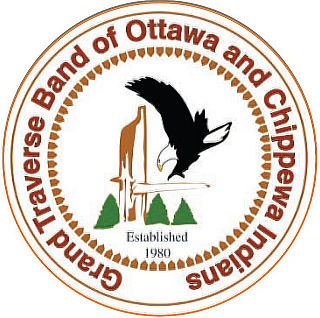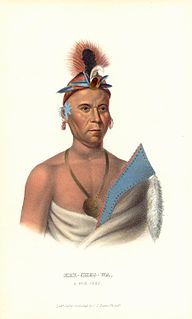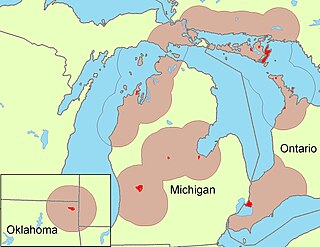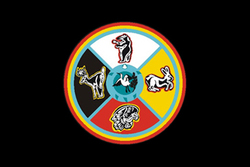 W
WThe Amikwa, also as Amicouës, Amikouet, etc., were a Native American clan, one of the first recognized by Europeans in the 17th century. The Amikwa were Anishinaabeg peoples, and spoke an Ojibwe language. In the Jesuit Relations, the Amikwa were referred to as the Nez Perce. They inhabited the north shore of Lake Huron, opposite the island of Manitoulin, along the shores between Missisagi and French Rivers, and along Spanish River. In September 1753, Bacqueville de la Potherie claimed that they inhabited the shores of Lake Nipissing. They were a large, powerful group allied with the Nipissings and related to the Outchougai, Mandua, and Atchiligouan peoples. The Amikwa were nearly wiped out by disease and wars with the Iroquois and the last of the tribe appear to have merged with the Nipissings or the Ojibwe.
 W
WThe Anishinaabe are a group of culturally-related Indigenous peoples resident in what are now Canada and the United States. They also include the Odawa, Saulteaux, Ojibwe, Potawatomi, Oji-Cree, and Algonquin peoples. The Anishinaabe speak Anishinaabemowin, or Anishinaabe languages that belong to the Algonquian language family. They historically lived in the Northeast Woodlands and Subarctic.
 W
WThe Bay Mills Indian Community (BMIC), known in Ojibwe as Gnoozhekaaning, is an Indian reservation forming the land base of one of the many federally recognized Sault Ste. Marie bands of Chippewa.
 W
WThe Grand Traverse Band of Ottawa and Chippewa Indians is a federally recognized Native American tribe located in northwest Michigan on the Leelanau Peninsula. Sam McClellan is the current tribal chairman, elected in June 2016 to a four-year term after succeeding Al Pedwaydon, who served from 2012 to 2016.
 W
WThe Hannahville Indian Community is a federally recognized Potawatomi tribe residing in Michigan's Upper Peninsula, approximately 15 miles (24 km) west of Escanaba on a 8.5755-square-mile (22.210 km2) reservation. The reservation, at 45°46′59″N 87°25′23″W, lies mostly in Harris Township in eastern Menominee County, but a small part is located in northeastern Gourley Township, also in Menominee County, and another in Bark River Township in adjacent southwestern Delta County.
 W
WThe L'Anse Indian Reservation is the land base of the federally recognized Keweenaw Bay Indian Community of the historic Lake Superior Band of Chippewa Indians.. The reservation is located primarily in two non-contiguous sections on either side of the Keweenaw Bay in Baraga County in the Upper Peninsula of the U.S. state of Michigan.
 W
WLac Vieux Desert Indian Reservation is an Indian reservation located in Watersmeet Township of southeastern Gogebic County, in the western part of Michigan's Upper Peninsula. It is the landbase for the Lac Vieux Desert Band of Lake Superior Chippewa. The reservation has a total land area of 328.04 acres (1.3275 km2), split into two sections in eastern Watersmeet Township.
 W
WLittle River Band of Ottawa Indians is a federally recognized Native American tribe of the Odawa people in the United States. It is based in Manistee and Mason counties in northwest Michigan. It was recognized on September 21, 1994.
 W
WThe Little Traverse Bay Bands of Odawa Indians (LTBBOI) is a federally recognized Native American tribe of Odawa. A large percentage of the more than 4000 tribal members continue to reside within the tribe's traditional homelands on the northwestern shores of the state of Michigan's Lower Peninsula. The historically delineated reservation area, located at 45°21′12″N 84°58′41″W, encompasses approximately 336 square miles (870 km2) of land in Charlevoix and Emmet counties. The largest communities within the reservation boundaries are Harbor Springs, where the tribal offices are located; Petoskey, where the Tribe operates the Odawa Casino Resort; and Charlevoix.
 W
WThe Mackinac Bands of Chippewa and Ottawa Indians is a state recognized tribe of Ojibwe and Odawa Native Americans, based in the state Michigan. The tribe is headquartered in St. Ignace, Mackinac County and has around 4,000 enrolled members. Today most tribal members live in Mackinac, Emmet, Cheboygan, and Presque Isle counties, however many tribal members are also located throughout the state of Michigan and the United States.
 W
WThe Menominee are a federally recognized nation of Native Americans, with a 353.894 sq mi (916.581 km2) reservation in Wisconsin. Their historic territory originally included an estimated 10 million acres (40,000 km2) in present-day Wisconsin and the Upper Peninsula of Michigan. The tribe currently has about 8,700 members.
 W
WThe Meskwaki are a Native American people often known by Western society as the Fox tribe. They have been closely linked to the Sauk people of the same language family. In the Meskwaki language, the Meskwaki call themselves Meshkwahkihaki, which means "the Red-Earths", related to their creation story. Historically their homelands were in the Great Lakes region. The tribe coalesced in the St. Lawrence River Valley in present-day Ontario, Canada. Under French colonial pressures, it migrated to the southern side of the Great Lakes to territory that much later was organized by European Americans as the states of Michigan, Wisconsin, Illinois, and Iowa.
 W
WThe Michigan Heritage Park was an open-air museum that spanned 10,000 years of Michigan history. It consisted of a half-mile trail loop that started with a pre-historic mastodon exhibit and ended at a Civilian Conservation Corps camp exhibit. The historical exhibits are recreations. The park was operated by Muskegon's Lakeshore Museum Center.
 W
WThe Odawa, said to mean "traders", are an Indigenous American ethnic group who primarily inhabit land in the Eastern Woodlands region, commonly known as the northern United States and southern Canada. They have long had territory that crosses the current border between the two countries, and they are federally recognized as Native American tribes in the United States and have numerous recognized First Nations bands in Canada. They are one of the Anishinaabeg, related to but distinct from the Ojibwe and Potawatomi peoples.
 W
WThe Ojibwe, Ojibwa, Chippewa, or Saulteaux are an Anishinaabe people of southern Canada and the northern Midwestern United States. In the United States, they have the fifth-largest population among Native American peoples, surpassed in number only by the Navajo, Cherokee, Choctaw and Sioux. In Canada, they are the second-largest First Nations population, surpassed only by the Cree. They are one of the most numerous indigenous peoples north of the Rio Grande.
 W
WThe Pine Creek Indian Reservation is the home of the Nottawaseppi Huron Band of Potawatomi (NHBP), a federally-recognized tribe of Potawatomi in the United States. The reservation headquarters is located at 1485 Mno-Bmadzewen Way, between Fulton, Michigan and Athens, Michigan. The historic structures on the reservation were listed on the National Register of Historic Places in 1973.
 W
WPokagon Band of Potawatomi Indians are a federally recognized Potawatomi-speaking tribe based in southwestern Michigan and northeastern Indiana. Tribal government functions are located in Dowagiac, Michigan. They occupy reservation lands in a total of ten counties in the area.
 W
WThe Potawatomi, also spelled Pottawatomi and Pottawatomie, are a Native American people of the Great Plains, upper Mississippi River, and western Great Lakes region. They traditionally speak the Potawatomi language, a member of the Algonquin family. The Potawatomi call themselves Neshnabé, a cognate of the word Anishinaabe. The Potawatomi are part of a long-term alliance, called the Council of Three Fires, with the Ojibway and Odawa (Ottawa). In the Council of Three Fires, the Potawatomi are considered the "youngest brother" and are referred to in this context as Bodéwadmi, a name that means "keepers of the fire" and refers to the council fire of three peoples.
 W
WSaginaw Chippewa Indian Tribe of Michigan is a federally recognized band of Chippewa located in central Michigan in the United States.
 W
WThe Sault Ste. Marie Tribe of Chippewa Indians, commonly shortened to Sault Tribe of Chippewa Indians or the more colloquial Soo Tribe, is a federally recognized Native American tribe in what is now known as Michigan's Upper Peninsula. The tribal headquarters is located within Sault Ste. Marie, the major city in the region, which is located on the St. Marys River.